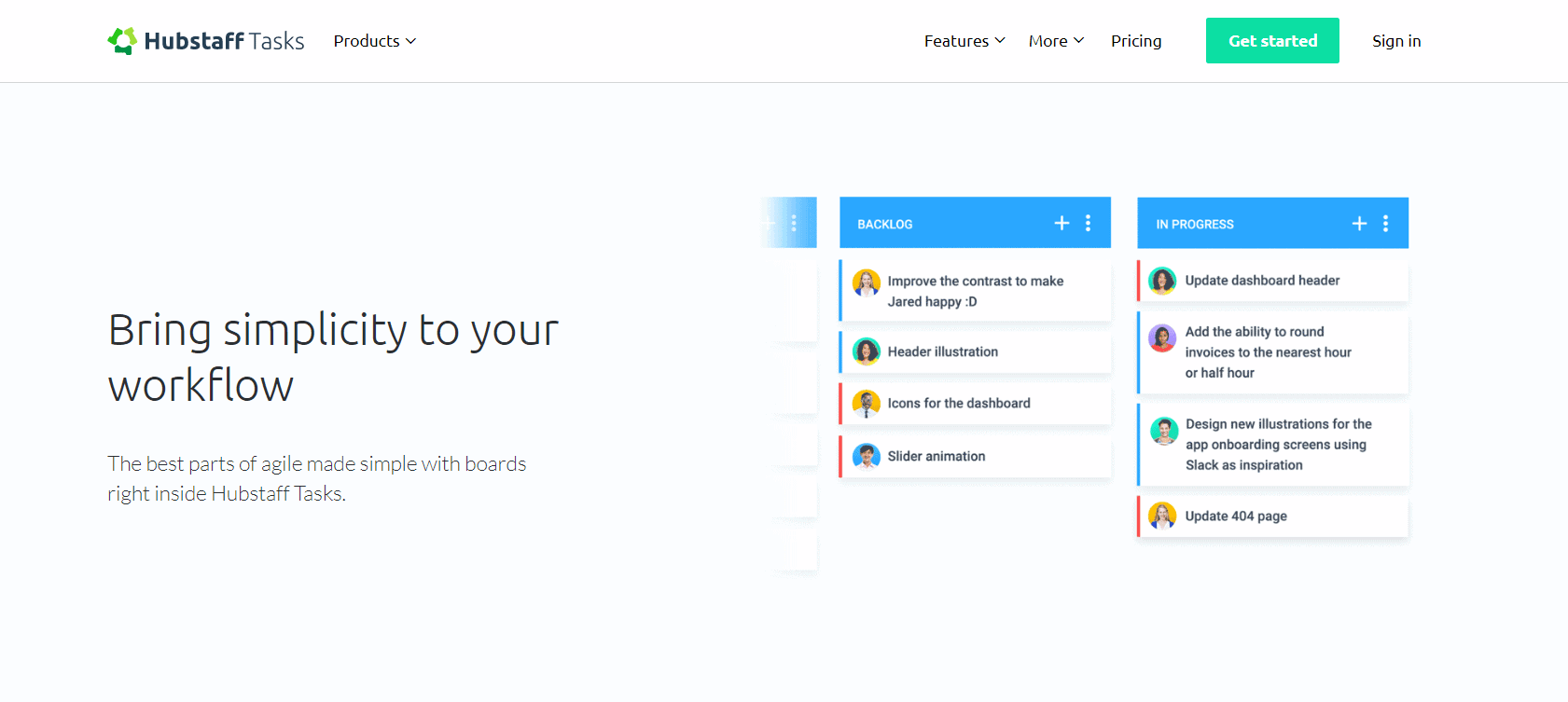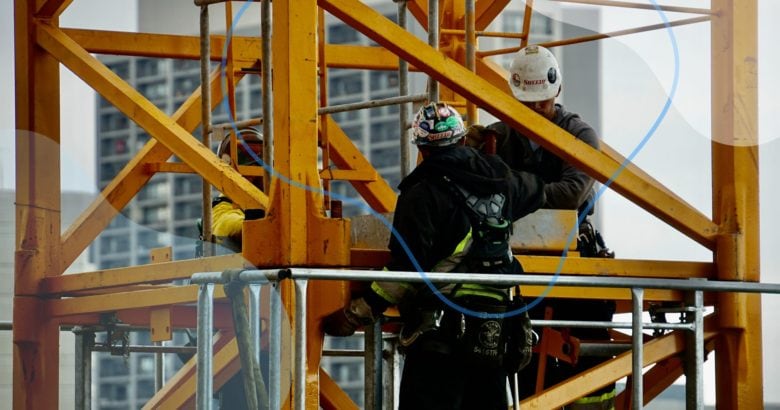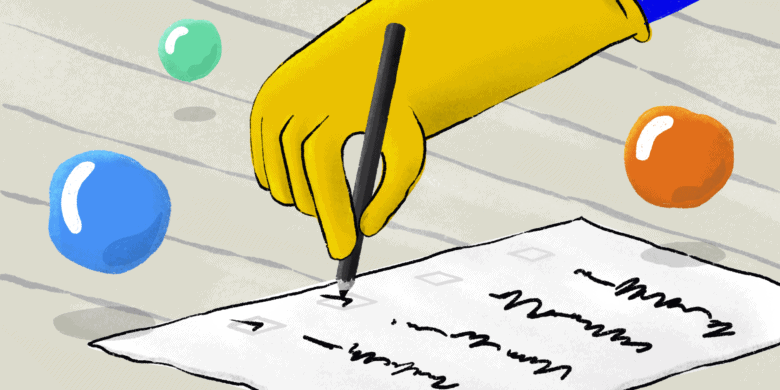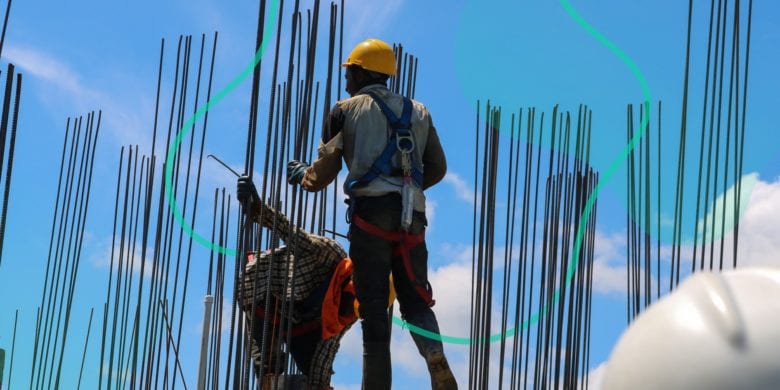Your time’s important, and so are your projects. Make sure you’re managing both well.
Maybe you’re new to this whole construction project management thing, and you’re looking for some advice. Or you might have a few years under your tool belt, but you’re looking to up your construction PM game.
Project management tactics and methods — a lot like the construction industry — are always changing. Because of that it’s good to stay up to date on the best way to manage your construction projects.
Enough small talk. Let’s cover everything you could possibly need to know about construction project management and give you a few useful tools to use to increase your productivity.
Boost your team’s efficiency with Hubstaff's productivity tools
Try it free for 14 daysWhat is project management for construction?
Good question.
If you want to get technical about it, construction project management (or CPM as the big-wigs call it) can be boiled down to this description. A project manager in construction is someone whose primary job is to direct and manage a skilled crew of people to complete high-quality construction projects while keeping budget in mind.
Simple enough, right? But what do construction project managers actually do?
Their primary job function is to make sure that their company’s projects are going according to plan and schedule. And, if there are any hiccups, they can quickly diffuse them to make sure projects get completed on time. To do this, construction project managers typically have to keep track of or maintain things like:
- Crew member progress
- Team delegation
- Quotes from third-parties
- Leadership goals
- Team birthdays
- Project quality
- Crew hours tracked and time cards
- Check-ins with higher-ups
- KPI’s
- Pizza Fridays
Though this isn’t a hard and fast rule, these job functions typically happen during the planning and construction phases of any given project. It also should be noted that construction projects, generally, are broken out into five phases: initiation, planning, execution, monitoring, and completion.
This is where you might be asking yourself if this is really that important of a job. Could a business owner just do all of this on their own? Let’s talk about that for a minute.
Why is construction project management important?
Think of it this way: Let’s say you’re going to a tailgate. Typically, your bud Bill is the one who gets there first to snag a spot before the game. He’s the guy who sets up the grill, fills the cooler with icy cold ones, sets up the tent, and makes sure there’s enough space for everyone’s vehicles.
Now imagine if you showed up to the tailgate, frozen burgers in hand, and there was no grill, no tent, and no Bill to be seen. He didn’t plan, didn’t source any beer or ice, and didn’t reserve the space.
Not a great way to spend a Saturday, is it?
This is precisely why project managers are so important. They’re the glue that holds projects together. They’re the ones who make sure that, before a single nail leaves the nail gun or piece of lumber is purchased, that your plans are ready to move to their next steps.
Project managers can not only make sure your construction jobs get done efficiently, but they can also make sure you’re not wasting any extra money.

How to manage construction projects like a pro
So you know what a construction project manager does, but now you want to be one. Or, if you are already one, you want to take your skills to the next level.
We get it, being awesome is awesome.
Whether you’re new to this or a veteran, here are a few quick tips that we think are essential qualities and skills for a project manager in the construction industry.
Tip 1: Communicate well
This one seems obvious, but it’s essential. Communication is the most significant part of being a project manager. To manage any project, you need to be in constant contact with clients, crew members, business owners, service providers, manufacturers, stakeholders, and pizzerias. If communication isn’t your thing, consider taking some courses on management or even socialization skills. Anything to make sure you’re the best CPM you can be.
Tip 2: Exude confidence
Didn’t think you’d get a pep talk out of this, did you? But, confidence is key for project management. Though you may not be a builder or electrician, consider yourself a part of the team. Voice your ideas, and be sure to reinforce your workflows. Make it clear to your team that if they follow you, everything will get done effectively, efficiently, and on budget.
Tip 3: Simplify things for yourself
We’re not saying slack off here. Look for ways to automate what you and your crew do. This could mean implementing something like geofencing technology so they can clock in and out on the job automatically. Look at your process and see what could use some help, then do some searching for possible solutions.
Tip 4: Lead well
Just like being a great manager or leader, you need to make sure your team trusts you and is willing to accept your ideas. Sometimes, you’re not going to be able to negotiate with the client, and the crew will have to replace all the light fixtures regardless of what you think is right. Be sure to encourage your team as much as possible and to diffuse problems properly.
Tip 5: Make timelines a priority
A lot of what CPM’s do is estimating and predicting needs and outcomes. A recent study found that only an average of 38% of project activities started on and finished on time. What’s more, the same survey found that construction project planners predict timelines with 58% accuracy.
That’s a scary number. As a CPM, look to get your timelines as close to perfect each time. By showing you can accurately estimate work, you will provide your clients and business owners with confidence that you can do the job and help them stay within budget.
Tip 6: Make check-ins a priority
The best way to see how a project is going is by checking in with those working on it. Make sure that you’re getting all your information from the source, so you can help put out fires (both figurative and literal ones) quickly.
Subscribe to the Hubstaff blog for more project management tips
A construction project manager’s task list, deconstructed
Here’s a breakdown of what a standard project timeline would look like if you were the PM leading this new hypothetical job.
- The bid: The first thing your company (let’s call them Builder INC) will get is a bid for work. That’s how you know the project is starting. So sharpen those PM pencils, there’s work to do.
- Ideation: Once Builder INC has the bid, the client will share their ideas for what they want to be done. So, if they’re renovating their designer New York apartment, they could ask for things like Italian marble and solid gold toilets. As the PM, you’ll be working with the client to bring it to life as best you can (while googling “solid gold toilet manufacturers” in your area).
- Negotiations: This is when you and the client negotiate contracts, start assembling the crew for the job, and start testing the field.
- Equipment: Once you’ve got a target budget, you can start gathering and sourcing any tools and equipment you may need.
- Crew setup: This step is often overlooked. You need to, before starting the project, make sure your crew is ready for the job. No, we don’t mean pack them lunch. But, you need to make sure they have an efficient way to track their hours so you can stay on budget. Don’t want any time theft happening on this job.
- Breaking ground: This is when the fun starts. Hammers start flying, cranes start moving, and the job starts up. As the PM, it’s essential to make sure that your established workflows, chain of command and responsibilities have been set for the crew.
- Project wrap-up: Once the construction is done and the marble is laid, it’s time to start wrapping up the job. This means you make sure all your equipment is up to spec, the clients have seen the space and approve, and you can enter the warranty period of the contract (if there is one).
- Completed: Now that the client has happily moved into the space, you can mark this job as completed. Be sure to make a note of any mistakes or road bumps that happened in your process so you can apply any findings to your next job.
As you can see, there’s a lot here that project managers need to, you know, manage. Thankfully, we don’t have to do all of this on pen and paper anymore. There are several helpful tools out there that can make all your PM tasks a lot easier and streamline a lot of your work.
The best project management software for construction project managers
A project manager — a lot like a contractor — is only as good as his or her tools. There are several amazing tools out there that you can use to manage your crew’s projects and timelines. Here are a few of our favorites for the construction industry.
1. Hubstaff Tasks

We may be a touch biased here, but we do believe that Hubstaff Tasks is the best project management tool for any business — especially construction. With Tasks, you can organize your projects into an automated workflow that actually works for you and your crew. Create tasks and epics and assign crew members so that you can track and monitor progress on every part of the business. And, with new features like stand-ups, you can stay up to date on everyone’s responsibility and better solve problems as they arise. Oh, and when someone comments on a task, you can respond with emojis (and who doesn’t love emojis, right?)
Plus, you can pair Hubstaff Tasks with our construction time tracking app Hubstaff so you can pay your crew, build invoices, and send out reports all from one place. And, with our Job Sites feature, you can use geofences technology to allow your crew to clock in automatically the second they arrive or leave a work zone. That means they don’t have to remember when they arrive, and you don’t have to worry that they’re not telling the truth — it’s a win-win.
2. Monday
Monday is a standard project management tool that allows you to create projects and see how they move through a timeline. You can plan timelines for your projects, and Monday will build data points visually for you so you can get insights on your team at a glance.
The main draw for Monday is their logistics planning, where you can plan out projects visually on a map. While Monday has some great features, their product is built for numerous industries, so there may be more than a few features that you won’t use and may get in your way.
3. SmartSheet
The folks over at Smartsheet have created a project management tool that adopts some unique features for the construction industry. Their program allows you to gather on-site data like field operation information from teams, vendors, and clients, quality control data to help reduce errors, and safety documentation for inspections and safety logs.
While Smartsheet has those helpful little features, its program can often be a bit confusing due to its cluttered cell-style design. It can be learned over time, but if you have many crew members cycling through your business, it may not be the best choice.
Where to start?
Ready to take the next steps into construction project management? Well, if you’re looking to get hired as one, take the required courses to become certified. If you don’t have enough work experience for that, look for entry-level positions that could give you some on-hand experience and the hours you need to take the certification classes.
If you’re a business owner looking to hire a project manager, be on the lookout for someone with lots of experience and those same certifications. When interviewing them, ask questions like, “How would you manage a new project from this client?” or, “How do you like to manage a team?”.
Still have a few questions? Well, we’ve got a few more answers for you.
Your questions answered
Is there a difference between construction project management and construction management?
Yes, actually. In the hierarchy of the company, a construction manager oversees and manages all construction-related activities. They’re on-site, making sure everyone is doing their job. A project manager is the one supervising the construction manager, so they’re checking in with them on progress and updating them on anything from the business side.
Can my construction company survive without a project manager?
Yes and no. Many companies don’t have project managers and end up putting those responsibilities on the owner or second in command. But, that can be a lot for one person to manage on top of their existing duties. It’s best to hire someone who’s had experience in the field and knows how best to manage your projects.
Can I just hire my wife’s sister to manage my construction projects?
Sure, you could if you wanted to. But, project management is a specified field that requires a lot of experience and, in many cases, proper certification. Look to hire people who’ve completed project management courses and carry the title of CPM or CMAA.
Where do I go to get certified as a construction project manager?
There are a couple of places you can start. The first is getting a bachelor’s degree in project management in a department like construction engineering, building science, or construction science. If the colleges near you don’t offer anything like that, an engineering degree can also work.
If you’re looking to get a certification in this field, the American Institute of Contractors offers construction project management certificates.
Most popular
How to Calculate a Raise: Practical Guide for Employers
By 2030, the US alone will lose $430 billion annually due to low talent retention — and a lot of this turnover stems from low pa...
How to Survive and Thrive in an 80-Hour Work Week
It’s hard to believe that only a century ago, the 80-hour work week was the norm in the United States. Then, in 1926, the Ford M...
Mastering Workforce Scheduling: Techniques and Tools for Success
Imagine a workday where scheduling your workforce effectively ensures that every shift is perfectly aligned with your business nee...
Top Time Trackers for Virtual Assistants: Enhance Efficiency and Accountability
Virtual assistants (VAs) have a lot of responsibilities — and so do the people who hire them. With so much to keep track of, a t...





